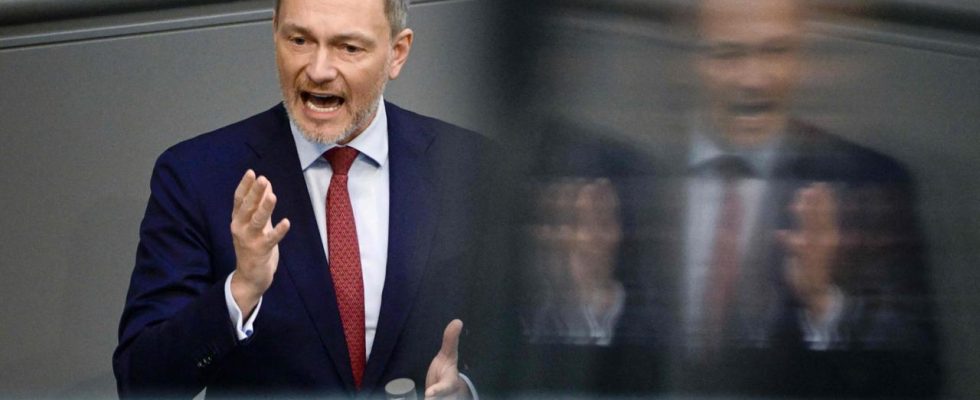analysis
The FDP is thwarting the quiet Easter week in federal politics with all sorts of old arguments and duping the coalition partners – once again. But this time concentrated. Why the party can hardly do anything else.
It could have been an idyllic Easter weekend. Finance Minister Christian Lindner was on vacation in the mountains with his wife Franca Lehfeldt: The obligatory Happy Easter photo with happy faces was on Instagram – in front of a mountain panorama, green meadow, cows and sunshine.
The story could end here. But it would be boring. And it doesn’t attract a lot of attention. Perhaps that’s what the FDP leader himself thought. In any case, Lindner began to thwart the Easter break with all sorts of political proposals and continued this way throughout the week: tax relief for the working middle class – because citizens’ money had also been increased “massively and disproportionately”. be. Compensation for cold progression, i.e. the indirect tax increase in times of inflation – a measure from which high earners benefit the most. Moratorium on social spending, at least for a few years. And we should also talk more generally about citizens’ money, as an update is necessary.
Lindner was flanked by FDP Transport Minister Volker Wissing, who emphasized that – yes, really – he was still absolutely against a speed limit. And from parliamentary group leader Christian Dürr, who made it clear that the welfare state should not continue to grow. The three pick up where the parliamentary managing director Johannes Vogel left off shortly before Easter, when he called for improvements to the pension package that had just been put together with the SPD.
The “Against” party that gives no peace
A statement inferno from the FDP in otherwise quiet times in federal politics. The Free Democrats are once again on the verge of rioting, it seems. The political proposals have one thing in common: they dupe the coalition partners SPD and Greens. With this repeated approach, one could speak of “Lindnern 2.0”: After “It’s better not to govern than to govern badly,” the following applies: “It’s better to help govern, but still act as if you were the opposition.” The FDP as an “against” party that doesn’t rest, not even at Easter. Why?
The FDP can hardly do otherwise. Firstly, because it represents fundamentally different views than its two larger coalition partners. And secondly, because right now – three weeks before the party conference and the upcoming elections – it can and must ingratiate itself with its electorate with typical FDP issues.
“What we have seen in the last few days was the communication of a crystal clear liberal profile,” says politics professor Claudia Ritzi from the University of Trier. “Lindner and Co are addressing their members and voters and using the party conference as an opportunity to outline their ideas beyond all constraints within the coalition.”
The speed limit on motorways is suitable for this. Surveys show that large parts of the population are in favor of introducing a speed limit. “FDP voters are typically against it,” says Ritzi. “The FDP knows what its electorate expects from it.”
A clientele that can only be found in a small part of the population, but which the FDP has so far almost always raised above the five percent hurdle. But the FDP is in danger of losing this clientele. According to current ARD GermanyTrend The party only achieved four percent – and would therefore no longer be represented in the Bundestag.
The FDP is trying to save what can be saved
The poor survey results are also a result of the government participation with the SPD and the Greens. Because that makes compromises necessary. “The electorate doesn’t appreciate it at all when the FDP deviates from the liberal core program,” explains political scientist Ritzi. The director of the Academy for Political Education, Ursula Münch, sees it similarly. “For the broad electorate, who only occasionally vote for the FDP, the party is seen as an obstructionist. The FDP does not prevent the core voters enough. This is life-threatening for them.”
The FDP is trying to save what can be saved: the core electorate. Now, before the party conference, before the European elections, before the state elections. The message remains the same, but is communicated even louder: less welfare state, less bureaucracy, more freedom and more tax relief.
SPD and Greens oppose something
This inevitably comes at the expense of coalition peace. “The conflicts are likely to increase,” predicts the political scientist Münch. “Pious resolutions do not fail because politicians are unable to keep them, but because they have completely different views on key points and a completely different understanding of the state.” The FDP does not see its role as opposition in the government as a reproach: “It says that something has to be done to counter two parties that are so ‘loving the welfare state’ and tend to spend money.”
But does it always have to be so loud, concentrated and rowdy? The political scientist Ritzi advises focusing on the matter at hand: “It would make sense to give a little less of the impression that this is about self-expression and generating attention.” Or about personal power struggles – like with basic child welfare. “This is about who wins in the end, and not just trying to negotiate measures based on the coalition agreement.”
It remains to be seen who will win this battle or whether everyone will lose in the end. But one thing is already certain: Even after the Easter holiday week, things won’t be quiet around the FDP.

